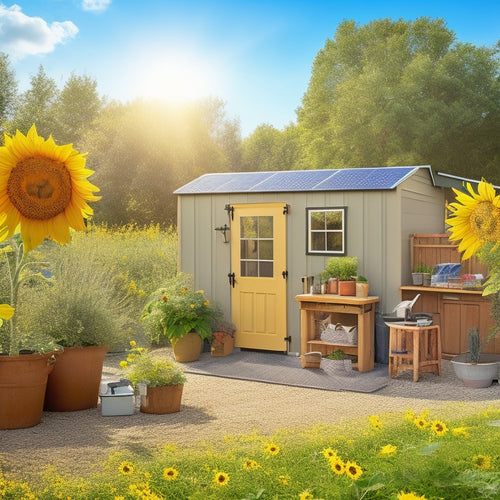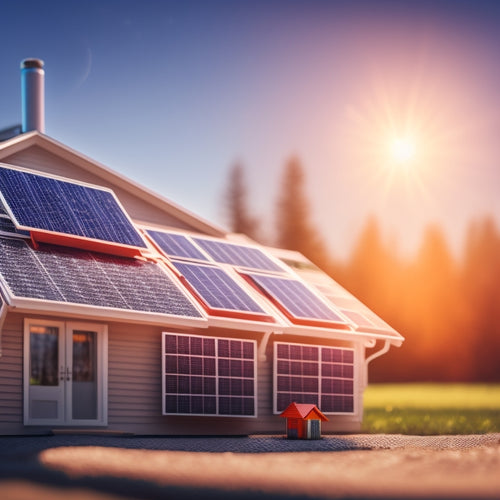
Home Roof Solar Panels
Share
You're installing home roof solar panels to utilize the power of renewable energy, enhance your property value, and reduce your reliance on traditional power plants. By doing so, you'll not only elevate your property value by 10-15% but also enjoy significant energy bill reductions of up to 50%. High-efficiency solar cells can maximize energy production, and a thorough shading analysis is essential to guarantee peak energy output. By adopting solar power, you'll decrease your carbon footprint and contribute to a cleaner environment. As you investigate the world of home roof solar panels, you'll uncover more ways to improve your energy savings and environmental impact.
The Essentials
- Installing solar panels on your home roof can increase its value by 10-15% and attract potential buyers with its modern aesthetics.
- Solar panels can reduce your energy bills by up to 50%, saving you hundreds or thousands of dollars over the system's lifespan.
- High-efficiency solar cells can maximize energy production, and selecting panels with efficiency ratings above 20% can yield greater long-term savings.
- A thorough shading analysis is crucial to assess energy production, as obstructions like vents, skylights, and chimneys can affect solar panel efficiency.
- By installing solar panels, you can reduce your dependency on traditional power plants, minimize your carbon footprint, and contribute to a cleaner environment.
Boosts Property Value Fast
You'll find that installing home roof solar panels enhances your property's market appeal, making it more attractive to potential buyers if you decide to sell.
This, in turn, can lead to a higher selling price, as many buyers are willing to pay a premium for a property with a renewable energy system.
By increasing your home's energy efficiency with solar panel installation, you can also reduce your reliance on the grid and lower your monthly electricity bills.
Increased Market Appeal
Adding solar panels to your home's roof greatly improves its market appeal, effectively increasing property value fast. In today's market, consumers are increasingly eco-conscious and willing to invest in sustainable living. According to recent market trends, homes with solar panels are in high demand, and their popularity continues to rise.
| Feature | Benefit | Increase in Value |
|---|---|---|
| Energy Efficiency | Reduce energy bills and carbon footprint | 10-15% |
| Environmental Sustainability | Align with consumer preferences for eco-friendliness | 8-12% |
| Modern Aesthetic | Enhance your home's curb appeal with sleek designs | 5-8% |
Higher Selling Price
Your home's solar panels can be a major selling point, elevating its selling price upward. According to market trends, homes with solar panels typically sell faster and for more money than those without.
In fact, a study by the National Renewable Energy Laboratory found that solar panels can increase your home's value by up to $15,000. This rise in property value is largely due to the allure of reduced energy bills and the appeal of sustainable living.
By investing in solar power and battery storage solutions, homeowners can also break free from reliance on the grid and reduce their electricity bills, allowing them to reap significant cost savings while taking control of their energy needs Renewable Energy Solutions.
As a homeowner, you can take advantage of solar incentives, such as the federal solar investment tax credit (ITC), to offset the cost of installation. This can make your home more attractive to potential buyers, who'll benefit from the reduced energy costs and increased property value.
With the growing demand for eco-friendly homes, installing solar panels can be a smart investment for homeowners looking to increase their property's resale value. By going solar, you're not only contributing to a cleaner environment but also enhancing your home's market appeal and selling price.
Increases Energy Independence Fast
By installing home roof solar panels, you'll reduce your energy bills considerably, as you'll be generating your own electricity. This means you'll own your power and won't be reliant on the grid, utilizing solar energy to fuel your home.
Additionally, with residential solar power systems, you'll be contributing to a more eco-friendly home. With solar panels, you'll be in control of your energy usage and costs, enjoying true energy independence.
Reduce Energy Bills
Most homeowners can slash their energy bills by up to 50% simply by installing solar panels on their roofs. This significant reduction in energy costs is made possible by utilizing the power of the sun, which is abundant and free.
By generating your own electricity, you'll rely less on the grid, resulting in lower energy bills. Additionally, you'll benefit from solar incentives, such as the federal solar investment tax credit, which can help offset the initial cost of installation.
As a homeowner, you can expect to save hundreds, if not thousands, of dollars on energy costs over the lifespan of your solar panel system. These energy savings can be substantial, especially for those who consume a lot of energy.
Furthermore, with solar panels, you'll have more control over your energy usage and costs, giving you a sense of freedom and independence from utility companies. By reducing your energy bills, you'll not only save money but also contribute to a cleaner, more sustainable environment.
Own Your Power
Own Your Power
With solar panels on your roof, you're taking a significant step towards energy independence, and the benefits are immediate. You're no longer reliant on the grid, and you're reducing your carbon footprint.
By utilizing the power of the sun, you're generating clean energy and storing it for future use. This means you'll see a significant decrease in your utility bills, and you'll be shielded from rising energy costs.
With energy storage solutions, you can store excess energy generated during the day for use at night or during power outages. This guarantees you have a steady supply of power, even when the grid is down.
By owning your power, you're taking control of your energy needs and reducing your reliance on utility companies. You'll enjoy significant utility savings, and you'll be doing your part for the environment.
With solar panels on your roof, you're not just generating power – you're taking a stand for energy independence.
High-Efficiency Cells Matter
You'll want to pay attention to cell efficiency ratings when selecting solar panels for your home roof, as they directly impact the amount of power you can generate.
High-efficiency cells boast higher power output per unit area, allowing you to maximize your energy production. By choosing panels with high-efficiency cells, you can enhance your power output and get the most out of your solar investment.
Additionally, top-rated high efficiency residential solar panels can help you reduce your electric bill and increase your energy savings.
These high-performance panels are designed to optimize energy production, making them a great option for homeowners looking to make the most of their solar investment.
Cell Efficiency Ratings
The efficiency of solar cells is a critical factor in determining the overall performance of a home roof solar panel system. You want to guarantee that your system generates the maximum amount of energy possible, and that's where cell efficiency ratings come in. These ratings measure how well a solar cell converts sunlight into electricity.
When choosing a solar panel system, you'll come across different cell types, each with its own efficiency rating. Monocrystalline silicon cells, for instance, have higher efficiency ratings than polycrystalline silicon cells.
While higher-efficiency cells may increase installation costs, they can lead to more energy production and greater savings in the long run. Look for solar panels with high-efficiency ratings, typically above 20%, to maximize your energy output.
Keep in mind that higher-efficiency cells often come with a higher price tag, but they can pay off in the long run. By understanding cell efficiency ratings, you can make an informed decision when selecting a home roof solar panel system that meets your energy needs and budget.
Power Output Boost
Utilizing the full potential of your home roof solar panel system relies heavily on high-efficiency cells, which can greatly enhance power output. You'll want to maximize your energy production, and high-efficiency cells are key to achieving this.
With advancements in solar panel technology, high-efficiency cells can convert more sunlight into electricity, resulting in a significant power output increase.
When selecting solar panels, look for high-efficiency cells with high conversion rates. These cells can generate more power per hour of sunlight, making them ideal for homeowners who want to maximize their energy independence.
Additionally, high-efficiency cells can be beneficial for energy storage. By producing more electricity during the day, you can store excess energy in batteries for later use, reducing your reliance on the grid.
This not only saves you money but also provides you with a sense of freedom and security, knowing you have a reliable source of energy.
Check Your Roof's Shading
When evaluating your roof's suitability for solar panels, you'll need to take into account obstructions that can cast shade on the panels.
Ideal locations for solar panels, such as top cities for solar power, often have minimal shading.
You should identify any permanent structures like vents, skylights, or chimneys that could block sunlight, as well as trees or neighboring buildings that may cast shade.
Roof Obstructions to Consider
Before installing home roof solar panels, you'll need to evaluate your roof's shading, taking into account obstructions that can greatly impact energy production.
Roof obstructions can be categorized into two types: permanent and temporary. Permanent obstructions include roof materials like skylights, vents, and chimneys, which can cast shadows on your solar panels. Temporary obstructions, such as leaves or debris, can be removed or cleaned regularly.
You'll need to think about installation challenges, such as maneuvering around obstructions to guarantee ideal panel placement. Additionally, you'll need to verify your roof's structural integrity can support the weight of the solar panels.
Local regulations may also impact your installation, so be sure to research and comply with any requirements. Aesthetic considerations, such as the color and design of the panels, should also be taken into account.
The orientation of your roof and the impact of weather effects, like snow or high winds, are also significant factors to evaluate. By carefully examining these roof obstructions, you can maximize your solar panel's energy production and enjoy the freedom of renewable energy.
Shading Patterns Over Time
Evaluating your roof's shading is a complex task that involves more than just identifying obstructions. A thorough shading analysis is essential to determine the amount of energy your solar panels can produce. You need to take into account the seasonal variation in shading patterns to get an accurate overview.
| Time of Day | Month | Shading Pattern |
|---|---|---|
| Morning | December | Heavy shading from trees |
| Afternoon | June | Moderate shading from roof vent |
| Evening | September | Light shading from chimney |
You'll notice that the shading pattern changes throughout the day and year. This is because the sun's position in the sky changes with the seasons, affecting the amount of shading on your roof. By analyzing these patterns, you can identify the best locations for your solar panels to maximize energy production. Keep in mind that even partial shading can greatly reduce your system's efficiency. By understanding your roof's shading patterns, you can make informed decisions about your solar panel installation and enjoy the freedom to utilize renewable energy.
Lower Carbon Footprint Guaranteed
By installing home roof solar panels, you'll greatly reduce your energy consumption from traditional power plants, which are major contributors to greenhouse gas emissions.
This reduction in energy consumption directly translates to a lower carbon footprint, mitigating your impact on the environment.
As a result, you'll be producing clean energy and minimizing your reliance on fossil fuels.
Reduce Energy Consumption
Your energy-hungry appliances and lighting fixtures are likely consuming more power than necessary, driving up your electricity bills and contributing to a larger carbon footprint. By adopting sustainable practices, you can reduce your energy consumption and lower your reliance on non-renewable energy sources.
| Energy-Consuming Devices | Energy-Saving Alternatives |
|---|---|
| Incandescent Light Bulbs | LED Light Bulbs |
| Traditional Water Heaters | Solar Water Heaters |
| Old Refrigerators | Energy-Efficient Refrigerators |
Frequently Asked Questions
Can I Install Solar Panels on a Metal Roof?
You can install solar panels on a metal roof, leveraging its advantages like durability and weather-tightness. However, consider factors like roof type, seam layout, and clip selection to guarantee a secure and watertight installation.
Do Solar Panels Work During Power Outages?
Can you truly be independent from the grid if your solar panels don't work during power outages? Unfortunately, standard solar panel systems don't function during outages, but with outage preparedness measures, you can maintain solar panel functionality and energy independence.
Are Solar Panels Covered by Homeowners Insurance?
You typically need to add solar panel coverage to your existing policy, and if you file insurance claims, you'll need to prove the damage wasn't due to maintenance or installation issues, so keep records and follow your insurer's process.
Can I Install Solar Panels Myself to Save Money?
Are you a handy person who can tackle complex projects? If so, you might consider DIY installation to save money. However, keep in mind that improper installation can void warranties, so it's crucial to weigh cost savings against potential risks and consequences.
How Often Should I Clean My Solar Panels?
You'll want to prioritize solar panel maintenance, as dirty panels can reduce energy output by up to 25%. Cleaning frequency depends on your location, but as a general rule, you should clean them every 6-12 months to guarantee peak performance.
Final Thoughts
As you utilize the power of home roof solar panels, imagine yourself standing on the shoulders of giants, gazing out at a future where energy independence is within reach. Like a signal shining bright, high-efficiency cells illuminate the path to a lower carbon footprint. With property value soaring and energy bills dwindling, you're charting a course towards a sustainable tomorrow. The forecast is clear: a brighter, greener future awaits, and it starts with the panels on your roof.
Related Posts
-

Building an Emergency Backup Solar Power System in 5 Essential Steps
Building an emergency backup solar power system involves five key steps. First, assess your daily energy needs to ide...
-

A Beginner's Guide to Navigating the Solar Investment Tax Credit
You're eligible to claim a significant Solar Investment Tax Credit (ITC) of 30% of total installation costs, but mane...
-

Smart Grid Technology Implementation Challenges
You'll encounter several challenges when implementing smart grid technology, particularly in cost management, scalabi...


